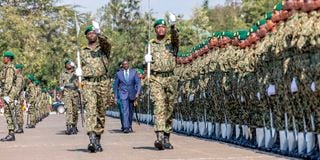Basic firearms training in NYS a mixed bag

President William Ruto inspects a guard of honour during the 88th National Youth Service recruits pass-out parade on August 26, 2024.
What you need to know:
- It could lead to perceptions that NYS is becoming a militarised institution.
- Exposure to firearms at a young age can have psychological impacts.
The National Youth Service (NYS) has played a crucial role in youth development by offering skills and discipline.
In response to evolving security challenges, there is a proposal to incorporate basic firearms training in the NYS curriculum, which has five merits and five demerits.
On the merits, first, it will lead to enhanced national security preparedness because the graduates can act as a reserve force in times of need, which is critical given Kenya’s complex security landscape— terrorism threats, wildlife poaching, and cross-border conflicts.
Secondly, it broadens employment opportunities by giving the youth a competitive edge in various sectors, including county law enforcement, Kenya Wildlife Service, Kenya Forest Service, and other security agencies.
Thirdly, it will enhance support for county security because counties face unique security challenges that require a localised approach.
Incidences of violence
Fourth, properly managed firearms training can instil a strong sense of discipline and civic responsibility in NYS graduates, reinforcing their role as responsible citizens and contributors to national stability.
Fifth, agreements can be developed integrating the NYS graduates into national security frameworks, which would enhance multi-agency collaboration and strengthen Kenya’s overall security architecture.
On the demerits, first, is the risk of misuse, leading to increased incidences of violence or accidents.
Secondly, it requires substantial investment in infrastructure, including training facilities, qualified instructors, and safety measures.
Thirdly, it could lead to perceptions that NYS is becoming a militarised institution, moving away from its broader mission of civic engagement and youth empowerment.
Phased implementation
Fourthly, exposure to firearms at a young age can have psychological impacts, including desensitisation to violence, and risks fostering a culture that over emphasises the use of force.
Lastly, it may face public resistance, particularly if viewed as a departure from the service’s traditional focus on community service and development.
To deal with these issues, there is need for a phased implementation of the proposal to assess its feasibility and impact and get valuable insights for necessary adjustments before a broader rollout. Comprehensive training on ethical use of firearms, conflict resolution and legal implications is also crucial.
Further, development of agreements with security agencies to ensure a coordinated approach and effective integration, and to facilitate the direct employment of graduates in county law enforcement is necessary. We also need to create public awareness to mitigate public concerns, build trust and ensure community support.
A carefully managed approach, strategic application, communication and re-alignment, with phased implementation, comprehensive training, and strong oversight, can mitigate these risks.
Dr Giti is an urban management, public-private partnerships and environment specialist. [email protected], @danielgiti





